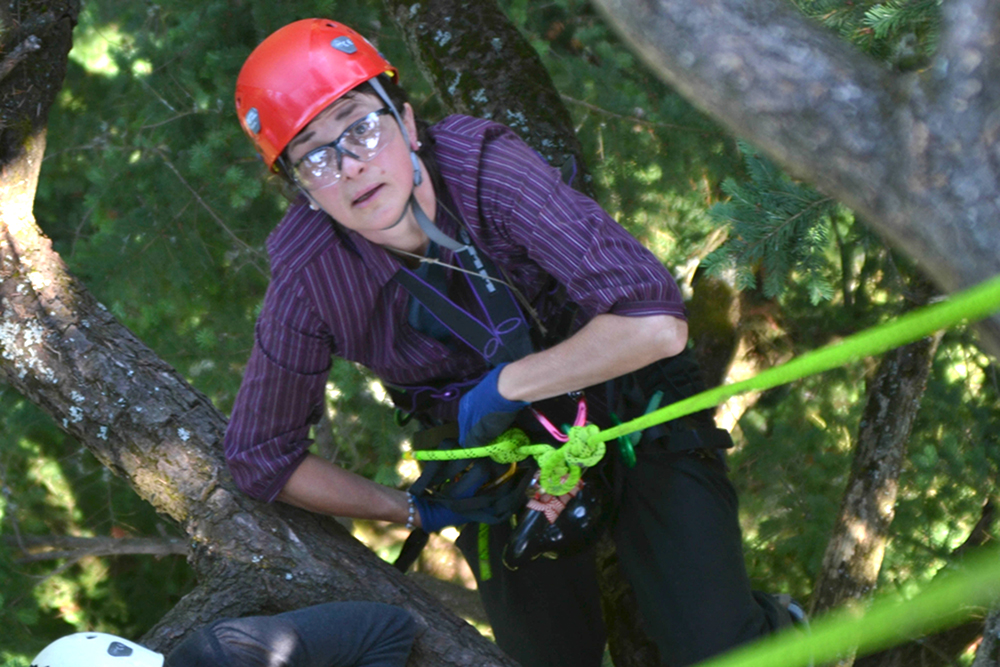Years before strolling among beautiful trees yet staring fixedly, blankly, into a tiny electronic device wouldn’t seem all that weird – which is to say, long before the world would dearly need it – researchers at the University of Michigan coined the term “soft fascination.”
It describes nature’s subtle power to draw our attention to the delight of birdsong, the caress of wind in treetops, the idle drift of clouds overhead. Calming sounds and sensations, so quietly inviting, so different from the hypnotic screen or insistent digital chirp.
“We don’t have to intentionally focus in nature,” Kathleen Wolf says, but simply open ourselves to the wonders of the natural world and their gentle tug. “Nature brings us to it.”
Spreading the gospel of forests’ restorative properties has become the focus of Wolf’s work as a research social scientist in the University of Washington’s College of the Environment. The Rolling Bay resident is among the featured speakers at the upcoming Bainbridge Environmental Conference, “The Future of Our Forests: Bainbridge Island and the Climate Crisis.”
The four-week online event runs Sunday afternoons through March, each week themed to a different aspect of forest health and stewardship. Wolf will present in the third session, March 21, on “Island Forests: Providing Self Care and Community Wellness.”
Wolf began her career as a biologist but always felt an innate connection between nature and culture, informed by her liberal arts education at Whitman College.
As the first urban forester for the city of Key West, Fla., she became attuned early in her career to the tensions and tug-of-wars over trees in urban environments. Even a community dedicated to tourism was somehow deeply ambivalent about the attractive value of a green streetscape.
“Go away, was basically what I was told,” she said, recalling a public hearing on tree retention. “I thought, I’m a scientist, I need evidence.”
It was during graduate school at the University of Michigan that she crossed paths with Rachel and Stephen Kaplan, pioneering environmental psychologists, who posited “soft fascination” as an element of what they called Attention Restoration Theory.
The Kaplans’ prescient 1989 tome “The Experience of Nature: A Psychological Perspective” explored the ways in which the sound of a babbling brook, for instance, or the rustle of leaves might offer health benefits to both mind and body.
Thirty years later, here we are: tethered to the digital leash of the smart phone, in a perpetual state of “On,” desperately needing the relief that a simple walk in the woods can provide.
Too much screen time, Wolf says, and “we deplete our cognitive abilities, we might feel frustration, we might even display some aggression to others, we become more impulsive,” she says. Yet as the Kaplans suggested, “brief times outdoors help us to restore that cognitive capacity, which can enable better thinking, more creativity and so on.”
Health outcomes from ‘green presence’
Over time, the intuitive has become empirical. Wolf cites a litany of studies showing that mindful immersion in forest settings can lead to stress reduction, better cardiovascular health and immune system response.
A Portland, Ore., study found that women who went through pregnancy in a treed environment had babies with healthier birth weights. Research shows that residents of elder care centers with nearby trees show reduced symptoms of depression. A patient in a hospital room with trees outside their window will likely heal faster, go home sooner and down fewer painkillers during their stay than another patient who stares out at a brick wall.
“Do you want me to keep going?” Wolf asks. “If you take a ‘health outcomes’ database and a ‘green presence’ database, and statistically put them together, you find these relationships. This happens across cities and entire nations.”
Some physicians, Wolf says, are now writing “park prescriptions” – directed regimens of exposure to the natural environment to promote a particular health outcome, to complement a patient’s other physical or pharmaceutical treatments.
“I do this for myself now,” she says, of her regular walks through the Ted Olson Nature Preserve. “I kind of self-prescribe. And we can all do this, just 20-30 minutes, 120 minutes a week. It’s just like any other lifestyle choice for personal health.”
The pandemic has offered an ideal case study, as park usage has surged dramatically nationwide over the past year. There’s a scientific term for this too: “Urgent Biophilia,” or humans’ innate impulse to seek solace in nature during times of catastrophe or stress.
While Bainbridge Island is blessed with large tracts of public forestland for all to enjoy, Wolf notes that climate change is putting the trees under tremendous stresses from drought, invasive species and other blights.
There was a time on when Bainbridge farmers, loggers and others whose lives and livelihoods were tied to the land would be keenly attuned to these changes. In our largely urbanized and thoroughly distracted age, the trees can fade into little more than a pretty backdrop to our busy lives.
“What troubles me is, there’s very little idea of reciprocal value or expression of gratitude for these spaces,” Wolf says. “They need stewardship, they need care, but we treat them like theme parks. We go, we have our fun, we go away, and somehow it’s like Disneyland, we think the staff will clean up. No. It’s on us.”
That’s where Wolf’s research comes in, reminding us to appreciate our trees – to give ourselves over to those moments of soft fascination – and to return the gift.
“People won’t ‘do’ for the forest,” she says, “if they don’t understand what the forest does for them.”
Bainbridge Environmental Conference
University of Washington Professor Kathleen Wolf will discuss “Island Forests: Providing Self Care and Community Wellness” during the third session of the Bainbridge Environmental Conference, March 21. The online conference runs every Sunday through March, and is sponsored by the Association of Bainbridge Communities, the Bainbridge Island Parks Foundation, IslandWood, Sustainable Bainbridge and other organizations.
Register for the conference and find the full schedule at www.islandwood.org/conference.



